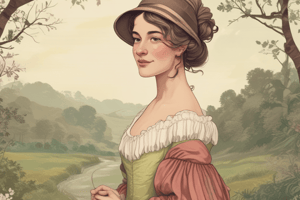Podcast
Questions and Answers
What concept did John Locke introduce regarding human nature?
What concept did John Locke introduce regarding human nature?
- Humans are born tabula rasa. (correct)
- Humans are born with predetermined characteristics.
- Humans are inherently sinful.
- Humans are born with original sin.
What was the primary source of power during the time described?
What was the primary source of power during the time described?
- Military strength
- Religious authority
- Land ownership (correct)
- Capital investment
How did Jane Austen approach her criticism of society?
How did Jane Austen approach her criticism of society?
- Through direct conflict with societal rules
- By using humour and irony (correct)
- Through political activism
- By promoting societal values
What serious aspect of life did Jane Austen comment on in her works?
What serious aspect of life did Jane Austen comment on in her works?
Which of the following entities did Austen criticize in her novels?
Which of the following entities did Austen criticize in her novels?
What was the main obstacle Jane Austen faced in her own attempts at marriage?
What was the main obstacle Jane Austen faced in her own attempts at marriage?
What is the historical context for the heavy presence of soldiers in Netherfield, as mentioned in Jane Austen's novels?
What is the historical context for the heavy presence of soldiers in Netherfield, as mentioned in Jane Austen's novels?
Jane Austen's novels often reflect the influence of the Napoleonic Wars, evident in what specific element of her writing?
Jane Austen's novels often reflect the influence of the Napoleonic Wars, evident in what specific element of her writing?
What is the relationship between Jane Austen's life and the concept of the Regency era?
What is the relationship between Jane Austen's life and the concept of the Regency era?
Which of the following statements accurately describes Jane Austen's position within the political spectrum of her time?
Which of the following statements accurately describes Jane Austen's position within the political spectrum of her time?
How did Jane Austen's life and writing reflect the shift from the Enlightenment to Romanticism?
How did Jane Austen's life and writing reflect the shift from the Enlightenment to Romanticism?
What aspect of Jane Austen's life directly influenced understanding of the social and political environment of her time?
What aspect of Jane Austen's life directly influenced understanding of the social and political environment of her time?
Flashcards
Tabula Rasa
Tabula Rasa
The belief that humans are born without innate knowledge or beliefs, like a blank slate.
Ironic Criticism
Ironic Criticism
A form of criticism that uses humor and irony to expose flaws and inconsistencies in society or institutions.
Power based on property
Power based on property
The idea that power and social standing were primarily based on owning land, and that this system was long-established.
Jane Austen's Critical Humor
Jane Austen's Critical Humor
Signup and view all the flashcards
Poaching
Poaching
Signup and view all the flashcards
Napoleonic Wars in Austen's Work
Napoleonic Wars in Austen's Work
Signup and view all the flashcards
What is the Regency period?
What is the Regency period?
Signup and view all the flashcards
Marriage and Class in Austen's Time
Marriage and Class in Austen's Time
Signup and view all the flashcards
Who were the Jacobins & Anti-Jacobins?
Who were the Jacobins & Anti-Jacobins?
Signup and view all the flashcards
The Origins of the Jacobins
The Origins of the Jacobins
Signup and view all the flashcards
Enlightenment and Romanticism in Austen's Time
Enlightenment and Romanticism in Austen's Time
Signup and view all the flashcards
Paine's 'Rights of Man'
Paine's 'Rights of Man'
Signup and view all the flashcards
Austen's Political Stance
Austen's Political Stance
Signup and view all the flashcards
Study Notes
Jane Austen's Life and Times
- Jane Austen lived during the Napoleonic Wars, a period of significant political and social upheaval. Her writing reflects this era.
- Austen's personal life included near-miss marriages, highlighting societal pressures and the importance of money in securing advantageous unions.
- Austen, a member of the gentry, faced limitations on marriage due to financial considerations.
- Key dates in her life:
- Born in 1775
- Lived in various locations: Steventon, Hampshire (1775-1801), Bath (1801-1809), Chawton (1809-1817).
- Died in 1817 at age 41.
- Key historical period: Regency Era (1789-1830), specifically a period of governance by the Prince Regent (1811-1820) during his father's madness.
- Austen was aware of the French Revolution and the Napoleonic Wars, evidenced by her knowledge of naval battles and the social impact of these conflicts.
- Familial connections to the Navy and her interest in the conflicts were evident in her writing.
Socio-political Context
- The Napoleonic Wars evoked substantial rivalry among European powers and shaped the social and political landscape during Austen's time.
- The French Revolution and its related conflicts (Jacobins/anti-Jacobins) fueled intense political debates within England.
- Public discourse, particularly through newspapers, presented Austen with opportunities to understand the era's major events.
- Rise of radical political thought challenged established social norms.
- The tension between established aristocracy and burgeoning radical ideas permeated Austen's society.
Philosophical Shift
- Austen's era experienced a transition from Enlightenment ideals of reason and logic to the Romantic emphasis on emotion and feeling.
- Enlightenment thinkers, like Locke, viewed the human being as born a "blank slate" (tabula rasa).
- In contrast, pre-enlightenment thought viewed humans as naturally flawed.
- The prevailing power structure was firmly grounded in land ownership (property).
- Critiques of this society and power structures were evident in Austen's work.
Jane Austen's Literary Style
- Austen used humor and irony as critical tools against societal expectations and conventions, rather than directly criticizing social norms.
- Austen's novels provide commentary on themes from the church's role in society (example: Darcy's influence) and the aristocracy.
- Her writing explored both the seriousness and broader perspectives of marriage and social class.
- Challenges to traditional societal values were reflected in her literary characters and social commentary.
- Critics often focused on the social situations and people in her novels when evaluating her works.
- The canonized status of her work was initially challenged.
Studying That Suits You
Use AI to generate personalized quizzes and flashcards to suit your learning preferences.





